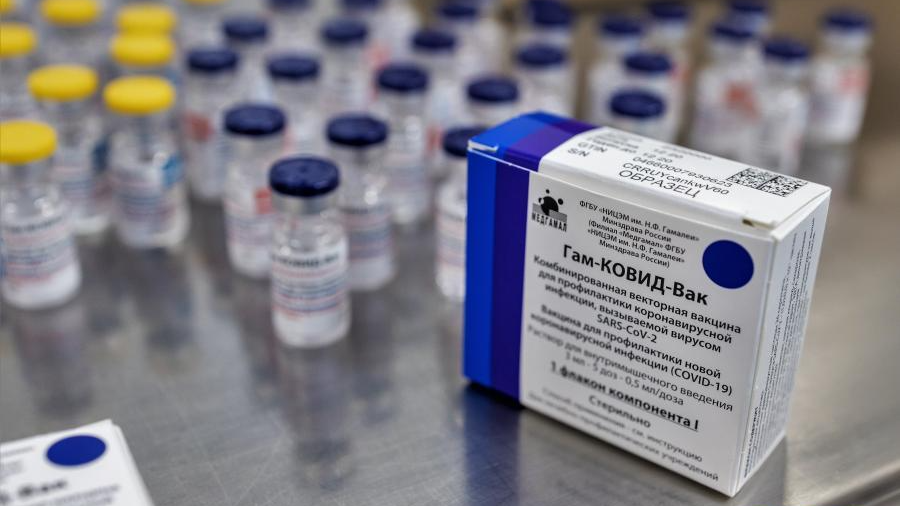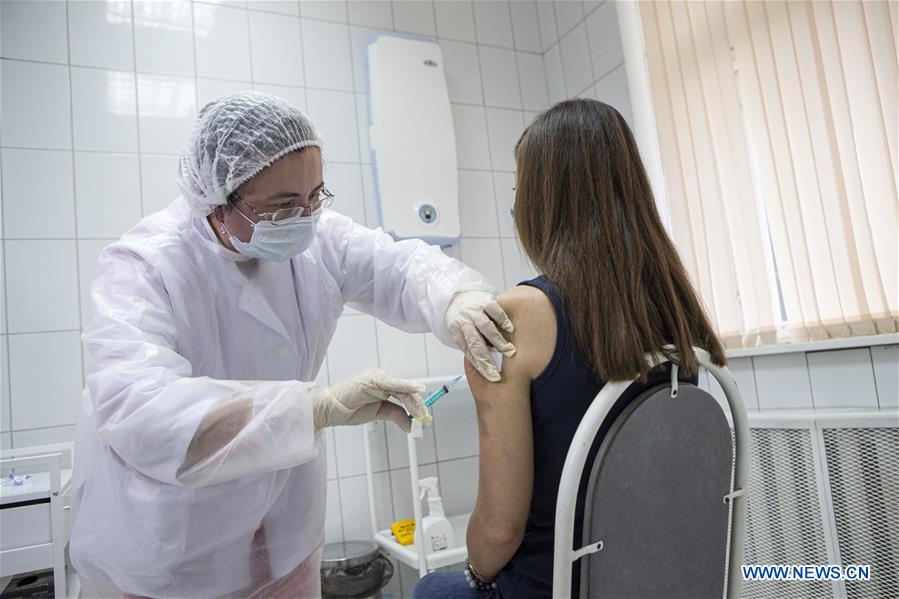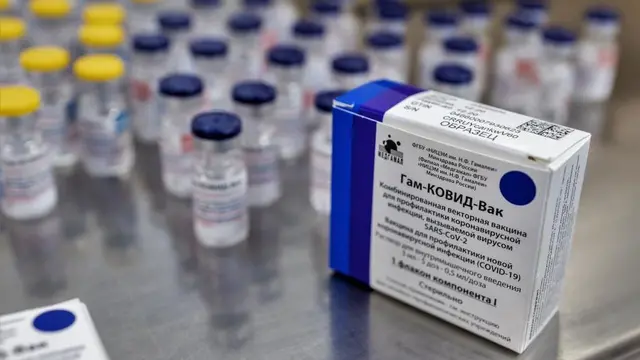
Russia's "Sputnik V" vaccine. /Xinhua
Editor's note: Danil Bochkov is an expert at the Russian International Affairs Council.He graduated cum laude with a master of economics from MGIMO-University under the Ministry of Foreign Affairs of Russia and a master of world economy from the University of International Business and Economics in China. The article reflects the author's opinion and not necessarily the views of CGTN.
On February 3, peer-reviewed journal The Lancet assured the Russian-developed "Sputnik V" vaccine is 92 percent effective in combating COVID-19. It was a sensational revelation following months of harsh criticism of the vaccine in its lack of safety and effectiveness data raised by Western media and politicians following the news that EU top diplomat Josep Borrell on his visit to Russia had hailed the success of "Sputnik V," outlining plans for its launch in the EU.
By accelerating the global rollout of Sputnik V, Russia pursues diplomatic, economic and humanitarian goals. Promoting a domestically designed cure speaks volumes of its technological sophistication and serves as a tool to boost its global image as a world leader fighting on the front line of the global pandemic, on par with other world powers, such as China and the U.S.
For Russia, it was important to become the forerunner in the global "vaccine race," which was made clear by Putin's August remarks calling Sputnik V a "world first" and "quite effective." This is reinforced by the nickname for the Russian vaccine – "Sputnik," which alludes to the USSR's arduous advancement in the space race with the U.S. in the mid-20th century.
No sooner had Joe Biden stepped into the White House, than he launched a comprehensive revision of Russia's past activities. Russia has been the focus of U.S. and EU reprehension with no sign of positive agenda associated globally with Moscow.
The Russian vaccine has strong diplomatic significance, since many countries face shortages or are experiencing trouble in getting the necessary amount of the antidote. The EU has been severely hit by delays in supply of Pfizer and AstraZeneca shots, which pushed several European states to halt or postpone their inoculation programs. Governments are facing national outrage over vaccine administration disarray.

A medical worker inoculates a volunteer with the COVID-19 vaccine named "Sputnik V" in Moscow, Russia, September 15, 2020. /Xinhua
As a countermeasure action aimed at resolving vaccine shortages, the EU has recently stricken the export control of the syringe. Hungary reached out to Russia in October for vaccine purchase, but was warned of administrative measures by Brussels if it bypasses the EU collective administration. However, falling short of promised supplies from the EU, Budapest in January was the first EU nation to ink an agreement with Russia to start buying "Sputnik V."
Some other EU countries are considering following Hungarian footsteps. Serbia became the first European nation to initiate purchases of China's flagship Sinopharm vaccine, which has a high degree of effectiveness measured at 86 percent. Now Hungary is planning to start administrating the Chinese vaccine later in the month.
From an economic perspective, Moscow is set to earn $19 billion by the end of 2021 supplying global demand of 1 billion shots of vaccine. Judging by the price difference with the Russian syringe being twice cheaper, Moscow is likely to earn somewhat close to Pfizer's prognosis of $15 billion with an expected production capacity of 1.3 billion doses.
For leaders in the global pharmaceutical industry, this accounts for one-third of the total revenue. Bayer in 2020 earned $45 billion, while Pfizer is outlining the same amount for 2021. For Russian companies it is a great chance to get swiftly elevated into the top cohort of global pharmaceutical leaders.
The humanitarian dimension is measured by the plans of Russia and China to supply developing countries with its flagship vaccine, providing credit for transportation as well as lowering the price tag. It can contribute to Russia's attempt to promote itself as a major world power passionate about global well-being.
In January, Russia produced 6.5 million doses and its production capacities are enough to put out 11 million doses in February and 15 million in March with expected build-up reaching 30 million per month by June. Mid-term plans are to hit an annual production of 500 million doses for next year. Still, it is not enough to cover expanding global demand, which is spurred by the recent delays in deliveries of Pfizer and AstraZeneca.
In February, more than 50 countries expressed their wish to purchase Sputnik V. So Russia, being unable to meet global demand on its own, is keen on increasing its production capacity by launching facilities in Brazil, China and India.
The Lancet may have contributed to the popularity of Sputnik V, but is not likely to rewrite the rules of the "vaccine race" based on the political calculations. However, further delays in deliveries from Pfizer and AstraZeneca are more likely to push the EU to resort to stricter punishing measures. This fact combined with successful trials of Sputnik V may become a warranting factor for some EU states to follow Hungary's and Serbia's examples and give preference to Russian and Chinese jabs.
(If you want to contribute and have specific expertise, please contact us at [email protected].)
 简体中文
简体中文

